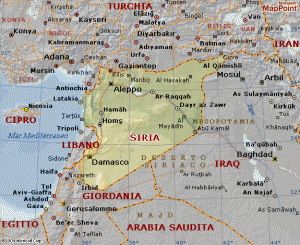Pax Christi International expresses deep concern over the severe repression by the Syrian government of the peaceful protests that started on 15 March 2011 demanding the release of political prisoners, then continued to spread from the southern city of Daraa to all parts of the country. Tens of thousands have taken to the streets in scores of cities and towns across the country calling for freedom, with the largest protests in Homs, Banias, Daraa and Damascus suburbs like Douma and Mouadhamiyyeh. Mass shootings of peaceful marchers have occurred every few days since then.
Syria has for years been suffering from chronic and systematic violations of civil and political rights by the State. Many political opposition- and pro-democracy-activists in Syria face arbitrary arrest, administrative detention, unfair trials, torture and ill treatment as well as other human rights violations due to the curtailing of actual freedom of expression, association, and movement as well as emergency laws. Many of these violations continue, despite the fact that the emergency situation was officially lifted last month.
Use of lethal force against peaceful protesters
Amnesty International has compiled the names of 580 protesters and others killed since mid-March ; the injuries in head and chest of those killed point at a shoot-to-kill policy. On Good Friday 22 April, Syrian security forces killed at least 120 people. Subsequently, international human rights organisations stated that president Bashar al-Assad and other members of the regime should be held accountable and that the case should be transferred to the prosecutor of the International Criminal Court.
Collective punishment
The Government of Syria responded to the protestors’ calls for freedom in massive brutality and oppression. On March 23, security forces opened fire on crowds in Daraa and enforced a siege since the 25 April. Since then Deraa was cut off from electricity, phone and water for two weeks, after troops and tanks attacked the city to restore government control. Similarly; military actions were taken against Homs, Douma, Harasta, Mouadhamiyyeh and the town of Banias. Security forces were reported to have moved into the central city of Homs , where troops backed by tanks have been raiding houses and arresting people since Saturday May 7th night.
Security forces are continuing their efforts to crush anti-government protests through collective punishment measures of city closures, water, electricity and communication lines cut off, food and medical supplies blockage from entering the besieged cities and towns. According to Amnesty International, “The Syrian authorities are tightening the vice on residents of cities around Syria, punishing whole populations in their attempt to stamp out opposition”.
Mass arrests
Pax Christi International would also like to draw the HRC’s attention to the situation of deliberate and systematic mass arrests, arbitrary and incommunicado detentions and enforced disappearances of people who are suspected of having taken part in the protest movement. The Syrian security forces are leading a crackdown against bloggers, journalists, political activists, human rights activists and physicians .
According to human rights organisation Insan, since mid-March nearly 8,000 people have been detained, of whom several hundred have disappeared. Allegations of torture practices have been widely reported by various International human rights organizations as well as activists and bloggers .
Independent media blocked
Since the protests started, Syrian authorities have denied access to independent media. A number of journalists have been arrested, including Al-Jazeera’s Dorothy Parvaz. Others were told to leave the country upon ending of their visas. This has led to a total media blackout. The only information coming out comes from the official media or from human rights- and opposition activists. Because of the mass arrests and repression- including cutting of phone lines and internet connections and arresting those who have satellite phones- it becomes harder and harder to verify and distribute information for these activists.
Lack of cooperation with UN
The establishment of the fact-finding mission by the Human Rights Council was an important step. However, the Syrian government blocked the fact finding mission established by the Human Rights Council’s 29 April resolution access to Deraa on 9 May. It also declined access to a UN mission carrying food and medical supplies to the besieged Daraa on May 10 and 11.
Recommendations
In light of these facts, Pax Christi International underlines the importance of the work of the UN Human Rights Council and calls on its members to take the following measures:
• Urge the Syrian authorities to put an immediate stop to the oppression and military operations against peaceful protestors;
• Call for the immediate and unconditional release of all who were arbitrarily detained during the protests and of all prisoners of conscience;
• Urge the Syrian authorities to ensure freedom of movement and of operations of UN agencies in all Syria;
• Demand that Syrian authorities cooperate with the fact-finding mission established by the Human Rights Council’s 29 April resolution, and to guarantee full and free access to all the locations;
• Urge the Syrian authorities to reform legislation, so as to meet international human rights standards, including incorporating human rights treaties in the national laws, and strengthen law enforcement and the rule of law;
• Establish a United Nations investigation into allegations of crimes against humanity
• Mandate a temporary UN Human Rights Observers mission in Syria;
• Mandate the Special Rapporteurs for Human Rights Defenders and for Torture, and later also other Special Rapporteurs such as the Special Rapporteur on Freedom of Association, to visit and report on the situation in Syria, and that the Syrian authorities fully cooperate with them and facilitate the visit;
• Mandate the Committee on Torture to look specifically into the issue of systematic torture during these protests;
• Urge Syrian authorities allowing access by the international media.
2011-0269-en-me-HR




